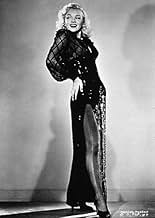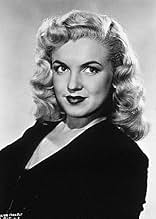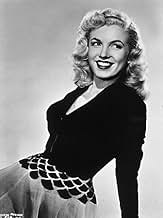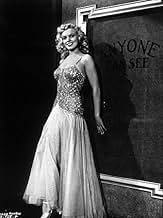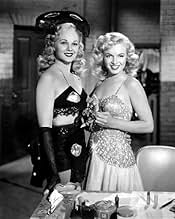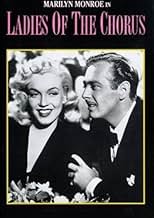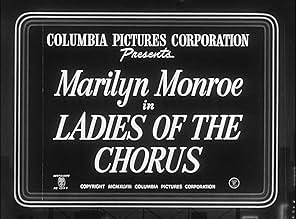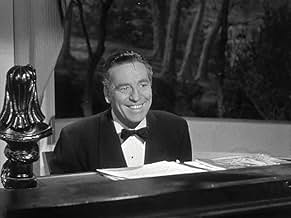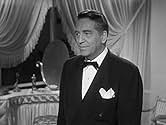Añade un argumento en tu idiomaA chorus girl falls in love with a wealthy young man, but their relationship is jeopardized by her mother's fears about the reaction of his family.A chorus girl falls in love with a wealthy young man, but their relationship is jeopardized by her mother's fears about the reaction of his family.A chorus girl falls in love with a wealthy young man, but their relationship is jeopardized by her mother's fears about the reaction of his family.
- Dirección
- Guión
- Reparto principal
- Ripple the Decorator
- (sin acreditar)
- Flower Shop Girl
- (sin acreditar)
- Audience Member
- (sin acreditar)
- Mr. Craig - Stage Doorman
- (sin acreditar)
- Peter Winthrop
- (sin acreditar)
- Party Guest
- (sin acreditar)
- Party Guest
- (sin acreditar)
- Party Guest
- (sin acreditar)
- Alan Wakely - Mae's Ex-husband
- (sin acreditar)
- Party Guest
- (sin acreditar)
- Burlesque Show Spectator
- (sin acreditar)
Reseñas destacadas
Marilyn stars as Peggy, a very young burlesque chorus girl who works in the chorus alongside her fortyish mother Mae (Adele Jergens). When the obnoxious "star" of the show walks out, Peggy steps into her part and becomes a sensation, earning the interest of various back door johnnies, in particular wealthy heir Randy (Rand Brooks). Peggy and Randy fall in love and he proposes but Mae is wary that Peggy will never be accepted in his social circles from her own past experience with her own annulled marriage to a socially prominent young man decades ago. Mae makes Randy promise to tell his mother (Nana Bryant) that Peggy is a burlesque queen in advance of their visit to the family's Cleveland estate, which he fails to do.
Marilyn is just adorable in this film and sings two surprisingly good songs for a "B" movie, "Anyone Can See I Love You" and "Every Baby Needs a Da Da Daddy", the latter a sexy little number that foreshadows her classic "Diamonds are a Girl's Best Friend" in sexiness and philosophy, right down to a reference to Tiffanys. Columbia's resident B queen of the era Adele Jergens is negated to a subordinate role as her mother, as still shapely middle-aged dancer who hides her gray hair under a blonde wig. Adele does very well at suggesting a slightly tired woman a decade or so older than her actual age and also gives a very good performance. (Adele was top billed in the original 1948 release but it appears only copies from the 1952 reissue exist where Marilyn was given that spot).
Rand Brooks (best known as Scarlett O'Hara's first husband in GONE WITH THE WIND) is quite pleasant as Marilyn's romantic suitor (they have a lovely scene together parked in a car that is an endearing ode to wholesome young love) and character actress Nana Bryant gives a pleasant performance as his mother, complete with a musical number of her own, the memorable "You're Never Too Old". Standing out in good comic unbilled bits are Gladys Blake as a gossipy sales girl and Dave Barry as a garbled-speaking decorator.
Running just a minute over an hour, the movie moves so quickly there's really no time for dull spots. This movie was reissued in 1952 by Columbia at the dawn of Marilyn's stardom but was virtually unseen for decades thereafter (likely because it was too short for most television movie programming slots); it reemerged in 1994 on video and a few years later had a handful of showings on cable television. Today your best bet in seeing it would probably be in buying a used copy of the out-of-print VHS tape or, if your DVD player can handle it, the region 2 DVD release from the United Kingdom in a Marilyn Monroe boxed set.
Given this film's feeble script and the twenty day shooting schedule, she can't do more than a competent job as a burlesque queen's daughter in a movie that avoids any suggestion of that tawdry world and the striptease. The dances and songs shown here are all mediocre, as is Phil Karlson's direction. In the beginning, MM was professional; she worked hard with was she's been given to play. She does her best in the few mother/daughter scenes with Jurgens who looks much too young to be believable as her mommy. Neither was MM helped by Columbia's casting of her leading man, Rand Brooks (Scarlett O'Hara's first husband in GWTW), who is particularly wooden and unattractive as the love interest.
A few years later, Marilyn did some rhinoplasty to fix nose and chin, but even in this minor effort she is still very beautiful and appealing. MM was determined to become a star, and when her moment came she was ready. She had paid her dues as this minor effort proves.
The ladies of the chorus happen to be May Martin (Adele Jergens), a former burlesque queen now dancing in the chorus with other much younger girls, one of them being her beautiful blonde daughter named Peggy (Marilyn Monroe). Peggy resents her mother's over protectiveness when wanting to go with Bubbles LaRue (Marjorie Hoshelle) for a night on the town after the show, but May lives only for her daughter's happiness, knowing full well that Bubbles is not the sort of person Peggy should befriend. After Bubbles quits the show on opening night, Joe (Frank Scannell), the stage manager, hires May to take her place. May has other plans. She has Peggy go on in her place. Peggy becomes a sensation as the new "burlesque queen." Her rise to fame at the Rome Theater soon attracts the attention of Randy Carroll (Rand Brooks), a wealthy young man, who anonymously sends her orchids on a daily basis. After Peggy gets to meet her new admirer at the flower shop, she becomes fascinated by him, enough to have dates and dinner before accepting his marriage proposal. Upon meeting with Peggy's mother, she results her feelings about her daughter's engagement by telling Randy via flashback her similar situation after marrying Al Wakefield (Bill Edwards), Peggy's father, much to the dismay of her former partner, Billy McKay (Eddie Garr), the man she should have married instead. It was after the family discovered May was a burlesque queen that her marriage to Al was annulled. Randy is convinced that his mother, Adele (Nana Bryant) and her society friends, are not that way. During the engagement party at the Carroll estate do both mother and daughter come up with some unexpected results.
Had it not been for the fact that Marilyn Monroe (1926-1962) ever appeared in LADIES OF THE CHORUS, chances are this so-so story with forgettable songs might have vanished into some dark corner of a dusty film vault along with other forgettable Columbia programmers from this period. Because of Monroe's rise to stardom that took place in the 1950s, LADIES OF THE CHORUS was reissued into theaters, with opening credits changing Monroe's name over the title instead of Adele Jergens. The reissue print is the one that's been circulating on television, and used years later on both video cassette and DVD. The film itself would have been more believable as well as acceptable had Jergens played Monroe's older sister rather than her mother, considering how Jergens doesn't seem old enough to have a grown-up daughter, even without the blonde wig she uses to appear younger during the burlesque musical show sequences.
Songs by Allan Roberts and Lester Lee featured are: "Ladies of the Chorus" (sung by chorus during opening credits); "You Belong to Me," "Every Baby Needs a Da-Da Daddy," "You Belong to Me" (all sung by Marilyn Monroe); "I'm So Crazy for You" (sung by Adele Jergens); "The Ubangi Love Song" (performed by the Bobby True Trio); and "You're Never Too Old" (sung by Nana Bryant). While such a song as "Every Baby Needs a Da-Da Daddy" simplifies Monroe's musical style along with "You Belong to Me," somehow Nana Bryant steals the limelight with her rendition to "You're Never Too Young." Other acts incorporated into the story include a father and son bubble talking under water-type interior decorators, Hipple and Hipple Jr., played by Dave and Alan Barry; followed by the jive-singing by the Bobby True Trio at the Carroll home. Others in the cast include: Steven Geray (Salisbury, the Butler); Myron Healy )Tom Lawson); Gladys Blake (The Flower Shop Girl); and Almira Sessions (Woman at Engagement Party), among others.
Formerly shown on American Movie Classics cable channel prior to 2001, LADIES OF THE CHORUS has also become part of the film library of Turner Classic Movies dating back to its humble beginnings of 1994. Even though its basic theme could have been "You're Never Too Young," the movie itself is strictly "B" material with story-line resembling those early talkie musicals of the late 1920s. Regardless, it does offer curiosity and interest for anyone interested in viewing the youthful presence of Marilyn Monroe in her only movie for Columbia. (**)
The actual star of this film is Adele Jurgens, a gorgeous blonde who did quite a bit of television in the 50s. Sadly, her career worked out but not nearly enough to offer her many more starring roles. On the positive side, she lived a very long and full life aside from acting.
As far as Jurgens, despite being the star, the casting of Monroe as her daughter (despite only being nine years older) must have been painful to her. Jurgens plays Mae Martin, a chorus girl who works with her daughter, Peggy (Monroe). But when Peggy falls in love and the man asks her to marry her, Mae is worried. After all, Mae's husband came from a good family, just like this man, and she is worried that love won't be enough to keep Peggy's marriage going strong. After all, 'good families' don't want ex-chorus girls marrying into their family...and Mae's husband just couldn't cut it. What will come of Peggy and her new man?
In addition to this plot, there is lots of singing and dancing...especially by Jurgens and Monroe. Considering the film is made by Lippert Studios, it's surprisingly good...as I usually expect very little from their productions. The best part is how all this worked out in the film....something that makes it all worth seeing.
It's a fine cast with scrappy Jergens doing well considering she has to play Monroe's mother, of all things. Kudos too to Bryant as Brooks's uptown mom, though actor Brooks seems pretty colorless which maybe he was supposed to be. Anyway, the famously skittish Monroe appears utterly relaxed and glowing in her role. Musical numbers, I think, always brought out the best in her. Also, this is before super- stardom began to weigh her down. Should also note that director Karlson shows his versatility here since his specialty otherwise was tough, tight crime dramas.
All in all, the little flick can be enjoyed on its own merits or as an early peek at perhaps Hollywood's most legendary actress.
¿Sabías que...?
- CuriosidadesWhen the film was re-released in November 1952, Columbia redesigned the opening title credits with the name of Marilyn Monroe over the title, and the name of Adele Jergens, who originally had top billing, moved to the head of the supporting cast; this is the version that was shown on Turner Classic Movies.
- PifiasIn a flashback that takes place more than twenty years earlier, the women's hairstyles and clothes are those of 1948.
- Citas
Chorus Girl #3: He says to me, "I'd like to see your show, baby, how about a couple of passes?"
Chorus Girl #2: The nerve!
Chorus Girl #1: And the guys I go out with don't want passes. They just make 'em.
Chorus Girl #3: Speaking of passes, I've been knocking down so many lately, I feel like an All-American.
- ConexionesEdited into Okinawa (1952)
Selecciones populares
- How long is Ladies of the Chorus?Con tecnología de Alexa
Detalles
- Fecha de lanzamiento
- País de origen
- Idioma
- Títulos en diferentes países
- Ladies of the Chorus
- Localizaciones del rodaje
- Empresa productora
- Ver más compañías en los créditos en IMDbPro
- Duración1 hora 1 minuto
- Color
- Relación de aspecto
- 1.37 : 1
Contribuir a esta página


